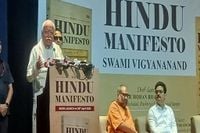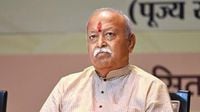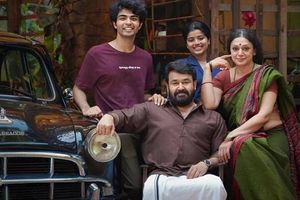NEW DELHI: In a powerful address on April 26, 2025, RSS chief Mohan Bhagwat articulated a nuanced perspective on non-violence and the necessity of taking action against hostile forces, particularly in light of the recent terror attack in Pahalgam, Jammu and Kashmir, which claimed the lives of 26 individuals, mostly tourists. Bhagwat asserted that while non-violence is a fundamental aspect of Indian culture, it is equally important to confront aggressors when necessary. His statements were made during the launch of the book "The Hindu Manifesto" by Swami Vigyananand, a senior figure in the Vishwa Hindu Parishad.
Bhagwat began by emphasizing the core values of Hinduism, stating, "We never insult or harm our neighbours. But if someone turns to evil, what is the other option? The duty of the king is to protect the people, and he must perform his duty." This sentiment echoes the long-standing belief in dharma, or duty, which Bhagwat insists includes not being vanquished by oppressors.
In his remarks, Bhagwat referenced the epic Ramayana, particularly the figure of Ravana, to illustrate his point. He noted that Ravana possessed many qualities that could have made him an excellent ruler but ultimately chose a path of evil. Bhagwat stated, "It was known that whatever you do, Ravan couldn’t be made a good person. Then, only one option was left — that his present body should be destroyed so that he could get another soul and body. This is why God killed him and this killing is not violence; it’s non-violence only." This comparison was perceived as a veiled endorsement of potential military action against Pakistan, which has been accused of sponsoring terror attacks in India.
Bhagwat's emphasis on non-violence was clear as he reiterated, "Non-violence is our nature, a key value... our non-violence is to change people and make them non-violent too." However, he acknowledged a harsh reality: some individuals may never change, and in such cases, he argued, action must be taken to protect the greater good. He stated, "Some people can never change. You do whatever possible for them. They won’t change and they will keep creating nuisance in the world... then what one can do in this situation?"
The RSS chief also criticized the current understanding of religion, lamenting that it has been reduced to mere rituals and dietary practices. He urged followers to return to the principles of Sanatan Dharma, which he defined as being rooted in the four pillars of satya (truth), suchita (purity), karuna (compassion), and tapasya (spiritual discipline). He declared, "Whatever goes beyond this is adharma (irreligious)." Bhagwat stressed that Hindu scriptures do not endorse untouchability or discrimination, stating, "There is no concept of 'oonch' or 'neech' (high or low) in Hindu scriptures. Untouchability and discrimination are against dharma."
In a broader context, Bhagwat's remarks come amid rising tensions between India and Pakistan, particularly following the Pahalgam attack, which has been attributed to The Resistance Front, a Pakistan-backed terrorist organization. His comments reflect a growing sentiment among some Indian leaders that a more assertive stance may be necessary to address the threat posed by such groups.
Bhagwat's address was not just a call to action but also a reminder of the ongoing struggle between dharma and adharma. He stated, "The current fight is between 'dharma' (righteousness) and 'adharma' (unrighteousness), rather than just a conflict between sects and religions." This framing of the issue suggests that the RSS chief views the conflict in moral rather than merely political terms.
Swami Vigyananand, who authored "The Hindu Manifesto," echoed Bhagwat's sentiments, arguing that Hindu thought has always addressed contemporary needs while remaining rooted in timeless principles. He emphasized the importance of understanding and presenting Hindu traditions and culture to the world in a way that fosters respect and understanding among different faiths.
The Pahalgam attack has shocked the nation and reignited discussions about national security and the need for a robust response to terrorism. Bhagwat's comments may signal a shift towards a more aggressive policy regarding Pakistan, as he highlighted the necessity of defending the nation against those who perpetrate violence.
As India navigates these complex issues, the dialogue surrounding non-violence, dharma, and the responsibility of leadership will likely continue to evolve. Bhagwat's statements serve as a reminder that while the principles of non-violence are deeply ingrained in Indian culture, the realities of modern conflict may necessitate a reevaluation of what it means to protect the nation and its citizens.
In conclusion, the discourse initiated by Bhagwat not only addresses immediate concerns regarding national security but also urges a deeper reflection on the values that underpin Hinduism and how they can be applied in contemporary society. The balance between non-violence and the necessity of action against oppression remains a central theme in this ongoing conversation.





